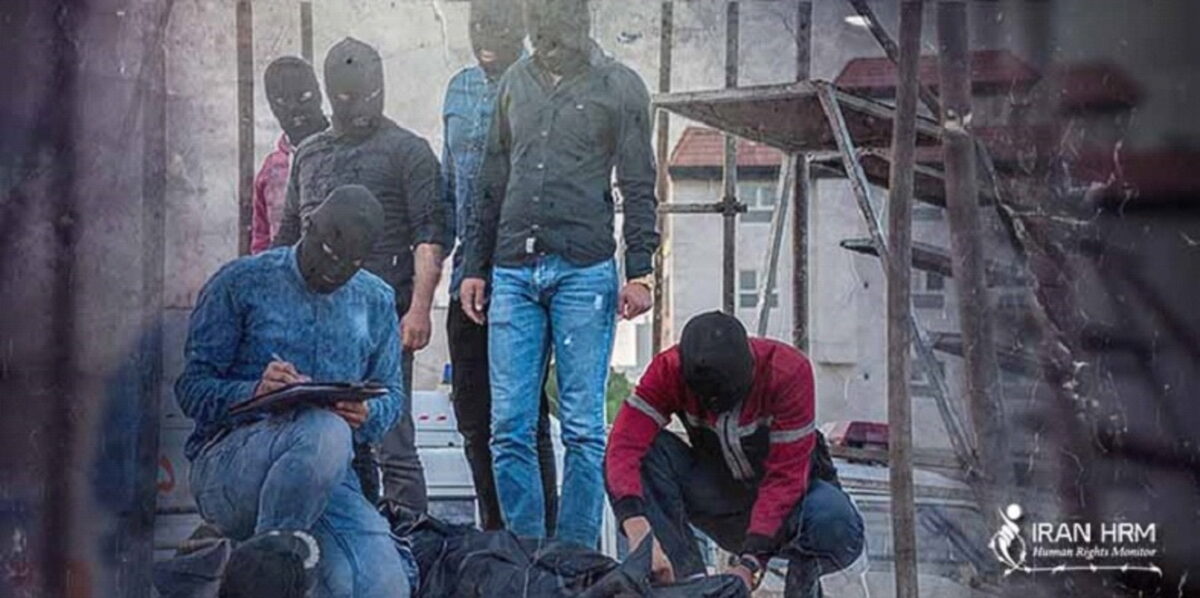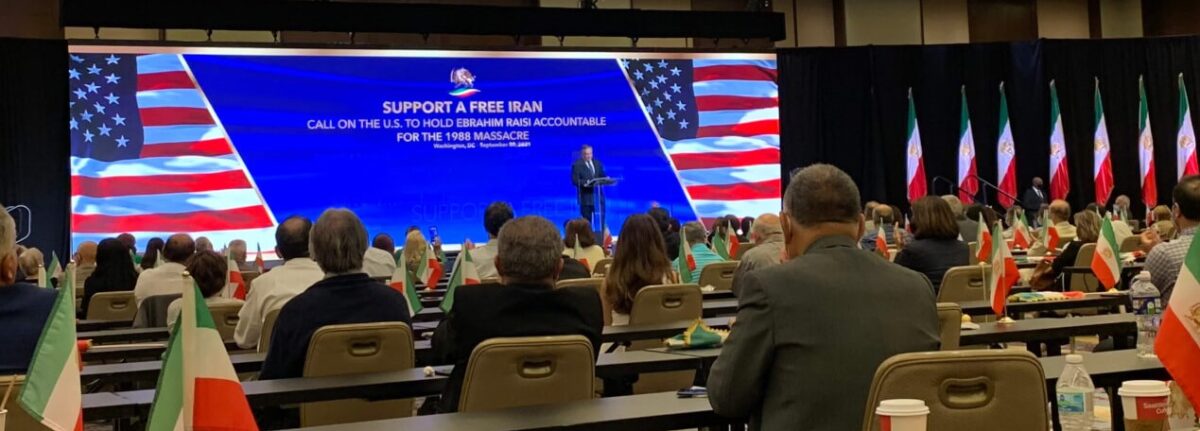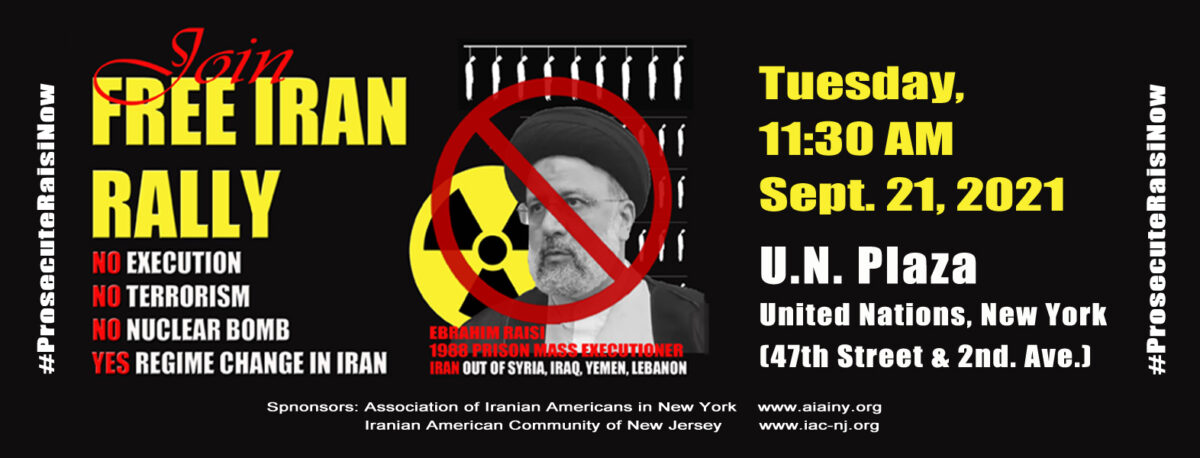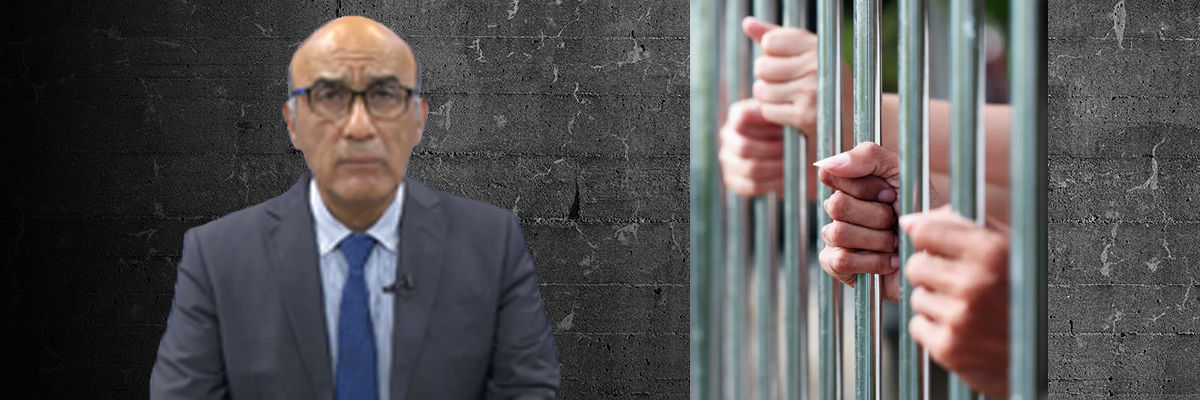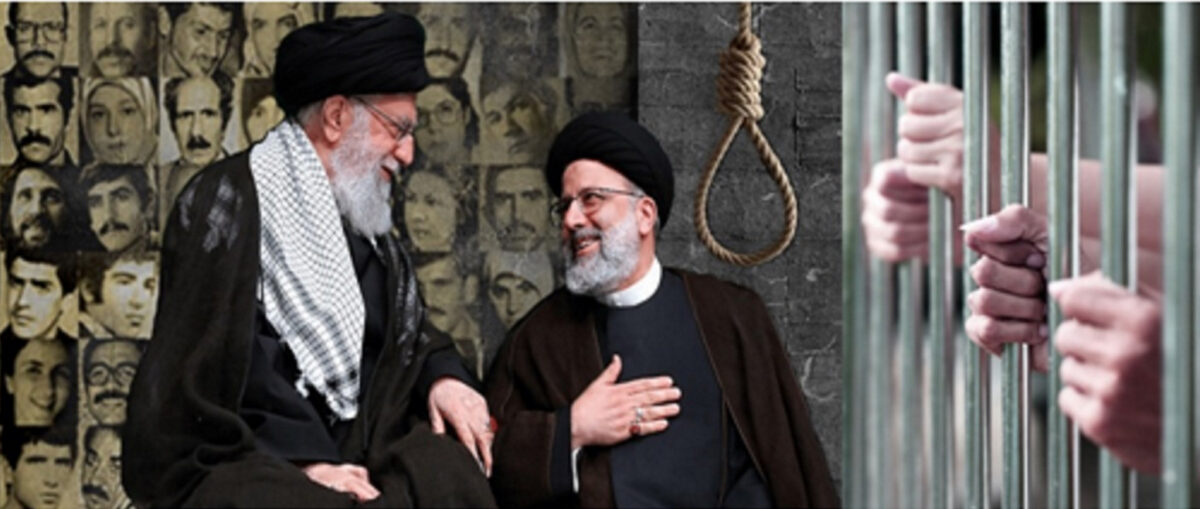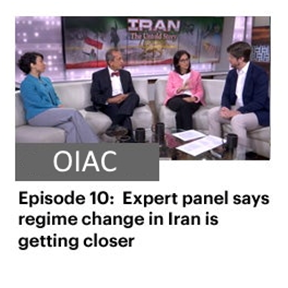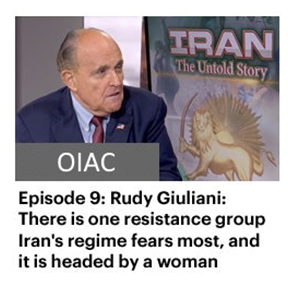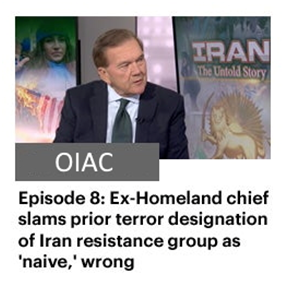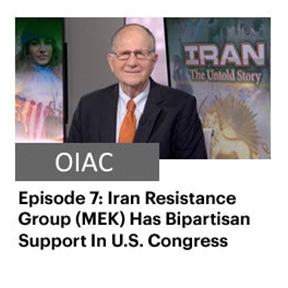Thank you all so much. That’s an amazing welcome. I hope you are as happy after my remarks. I think you will.
Thank you, Amir, for that kind introduction. It is such a blessing for me to be with you all today. It is a special gathering that we can all be together to talk about an enormous threat to the world and to freedom loving people. It’s truly an honor.
Since I last spoke to you Ebrahim Raisi was formally installed as Iran’s latest so-called President. You are rightly gathered at this conference with the theme of demanding that he be held accountable for what happened in 1988, the massacre of political prisoners inside of Iran. And I want each of you to know today that I join with you in your cause!
I came to know Raisi when I was the CIA Director. He should be prosecuted; not tomorrow; not next week; not next year. Prosecute him now.
And of course, I will talk more about this. But I support a free Iran! Bless you for staying in the fight.
Make no mistake, Make no mistake. Ebrahim Raisi, himself, is personally responsible for the mass execution of thousands of Iranian political prisoners, names of over 5,000 have been published. The bodies of these brave men and women were dumped in unmarked graves. And Because Iran has never, and likely under this regime will never allow an investigation into these killings, we do not know the true number of Iranians who were murdered. But it is almost certainly more than the 5,000 list of names that we have.
Your actions, our actions supporting our love of the Iranian people must begin by holding Ebrahim Raisi accountable for his crimes against humanity. Remember he wasn’t an advisor, he wasn’t a foot soldier. He was an executioner.
I know there are those in the audience who have family that were killed in Raisi’s massacre. Too, some of you have loved one and friends currently imprisoned, in Evin and elsewhere in Iran, and, some, who have had loved ones simply disappeared or worse. We will never forget any of them and will pray for you and each of them.
You know this character Ebrahim Raisi is exactly who Khamenei wants as President – someone who will do his bidding. Someone willing to brutalize and slaughter the Iranian people at his command. This is not moving forward. It is moving backwards.
It is only those who are resisting, both inside and out, who provide the hope for Iran. That is why this gathering and the work you do today is so important.
The contrast between a government that serves its people rather than subjugates them is incredibly stark. We can see it. That should be all of our inspiration for freedom for the Iranian people.
It’s has been almost eight months since I left office as the Secretary of State. When we left as Secretary of State, Iran was more isolated and the regime as weak than ever. However, I must say I’ve watched the events of the past weeks and months and I worry that events in Afghanistan and the posture of the current administration are allowing the regime to get “off the mat” and re-strengthen. I know the Iranian people do not want that. That is why we must keep pressure on our representatives to forgo renegotiating the nuclear deal and avoid paying Iran ransom to either re-enter that deal or because they believe it would be a show of “good will.” Good will is not something a terrorist regime understands. We must also ensure that advancements in the Iranian nuclear program are strictly monitored and action taken whether that’s by the United States, other western nations or by the IAEA to ensure that they don’t just run out the clock on the path not only to a nuclear weapon but to a full nuclear program.
I must say, over the last year or so of the pandemic the Iranian regime has used the coronavirus to continue crackdown on its own citizens. Its actions are not only ignorant but malevolent. They have used the pandemic to extinguish uprisings and subdue the Iranian people. This is totally unacceptable.
As Americans, we know supporting the general welfare of our citizens is the duty of the government, and to subjugate them is horrific.
And while we know that the Iranian regime does not value freedom, we should at least expect the United States to value that freedom. You have all watched these last few weeks. Our credibility was called into question in our disgraceful exit from Afghanistan and again questioned this past week when our own Secretary of State took down a tweet of support for the people of Hong Kong who were asking for freedom in their struggle against the Chinese Communist Party.
These demonstrations of the absence of resolve and lack of support for freedom-loving people are the welcome by terrorists and those oppressing the people of Iran.
And yet we know that the more the government attempts to strengthen its hold over the people of Iran, the weaker it will become. This is certainly the case today. Protests spurred by water shortages erupted in over half of the country’s provinces and protests have taken place in Ahvaz, in Tabriz, in Tehran, an in Isfahan, and other cities all across Iran. These protestors, these amazing freedom-loving people have shown considerable resilience and bravery in resisting the regime. And I know that in the end the Iranian people will have a secular, democratic, and non-nuclear republic.
The actions in 1979 were of course a key turning point. To understand Iran and its rightful place in history we must unpack what happened in 1979. I think this is why Iran will never return to rule by a dictatorial Shah or theocratic regime. This fight is the real fight and it began in those frightful first moments of the so-called revolution in 1979.
The central fight is the one in the streets, and in the mosques and in the minds of the Iranian people – it is the divide between the people and the organized opposition seeking freedom and democracy on one side, and the entirety of the regime on the other.
Look, I have been at this, but not as long as some of you. But I have been in this fight on the right side for over a decade now, my entire life of decade of public service. Back in 2010 I spoke with many of you. I spoke of the Iranian people and their history, their kindness and their respect for reason, knowledge and respect for human life. The Iranian people are tolerant people – They have been a homeland for Arabs and Jews, Christians and Muslims right on Iranian soil. This is the loveliness of the Iranian people.
The Iranians want to prosper in their faith and protect their families – this is as true in Tehran as it is in any place here in the United States and don’t ever forget that.
There is a new leader, there’s a new elected, I say that word cautiously. The regime headed by the puppet Raisi and the IRGC is no less radical than the one left by the previous president. It continues to be revolutionary in its zeal. It is brutal. It is theocratic.
It is also craven and fearful of the Iranian people. It’s kleptocratic. Its leaders will and have killed their own by the thousands and then choose those who committed these massive atrocities, like Raisi, to now lead their terror organization and their regime. Its leaders can shoot down a civilian airliner killing hundreds of civilians and think nothing of denying responsibility and hiding the black box that would unpack the clues and finger prints of the regime’s leaders who caused the death of civilians. The leaders in Iran seek not only to dominate their own country and their own people, but capitals from Baghdad to Tehran and from Damascus to Beirut and to Sanaa. All for the petty desire to maintain their grip on power.
When I last spoke to you I noted that we must dismiss the Western conceit. I hear it even in this city which we sitting today. It’s this western conceit commonly accepted in Brussels, in Paris, in Bonn and in too many places here in the United States that there are moderates inside of the regime. I never met one, nor read of one. This is important. The lie, that there are moderates inside of this regime. There are too many countries that play footsie with this terrorist regime. The elections of last month should provide evidence that this claim of moderation is even possible within this regime. We cannot have them fool us. These are but tiny actors occupying roles in the same show of force.
We know the characters. The Ayatollah plays the father, keeper of the so-called revolutionary faith and is the elder statesman “protecting the revolution” from every threat – including the threats from the heathen secular inside and outside of Iran. Soleimani played the warrior-hero-role. Deliverer of rights against made-up grievances from the near abroad and afar. The newly installed Foreign Minister, Hossein Amit-Abdollahian, was molded by Soleimani. This man, despite of the fact that he is a diplomat, a Foreign Minister, make no mistake who he is. He is a staunch supporter of the “Axis of Resistance,” the array of terrorists that Iran supports throughout the entire Middle East. He is a terrorist himself who would kill his own people to save the regime just as quickly as any other of the Ayatollah’s henchmen. Don’t let that title of diplomat fool anyone. Ebrahim Raisi, a murderer of his own people, will now take on the role as heir apparent to the faith and determined negotiator who concurs America by getting the immoral sanctions placed upon the people lifted and improving life for all. This will be the theatre of Ebrahim Raisi. These actors – each of them, all of them – will keep this show going despite the audience wanting their run to end and they are prepared to use every power, to use the IRGC, to use the Basij and any tool to keep their grip over the Iranian people.
There is nothing new about them. They are just the next generation of the regime, perhaps even more radical than their predecessors. Every one of them should be held accountable, all of them should be held accountable, for the tens of thousands of Iranians they have murdered.
And world leaders, I hope you are listening, should band together to reject Raisi; each of you, each of you should reject Raisi. You should refuse to engage with him, to acknowledge him as a democratically elected president by the people—since he was no such thing. A good place to start would be by this week at the United Nations General Assembly, not too far from where we are all sitting, holding Raisi accountable for his crimes against the people of Iran. It’s possible to do.
Speaking of Raisi’s actions, Kumi Naidoo, Secretary General of Amnesty International (2018-2020), said in his remarks to the Call for Justice: “I served as the Secretary-General of Amnesty International during which time a report was brought out on this terrible tragedy and the tragedy of 1988 that we saw took place in Iran. Let us be very clear, what happened in 1988 was a totally brutal massacre of political prisoners, which is a crime against humanity.” This former leader of Amnesty closed with this: “And if you go with the definition, notwithstanding the technicalities, it amounts to genocide.” We know a bit about this. We have to keep the Iranian regime in a box.
Contrast the current administration’s posture toward the regime with the one that the Trump administration had. Our mission was really very simple. We laid down 12 very simple demands, twelve requirements that made clear that if the Iranian regime failed to do that we would apply every American power and indeed we would build a coalition around the world to deny the regime the power to kill its own people and to foment terror around region and indeed around the world. This seemed so straight forward to me. We formed alliances to achieve these ends and supported Israel’s efforts to enhance our pressure campaign as well.
This administration is returning to the roots of its past, It’s the Obama Policy 2.0. They are seeking to walk away from the support we had provided to the Iranian people just as they did in 2009, when the Iranian people demanded freedom and the administration walked away from them.
But here is the good news. The resistance forces in Iran, these noble Iranian patriots, are as strong as they have ever been and they provide optimism for everyone around them who supports them. You do that too.
You can actually see this. You can actually see the effects of the last years of our work in their recent elections. Every more effort had to be made. The regime became more desperate, the fraud had to be increased and the Iranian people could see it as plain as day. Since 1979, every election in Iran has served only to give an appearance of republicanism to a corrupt, brutal theocracy. The 2021 presidential election, however, was really different. It is vastly different from those before it, primarily because it is taking place when the theocratic regime is at its most precarious state since it took power in 1979, and the people of Iran know this. Its prospects of survival are openly questioned by regime insiders and challenged by a restive, freedom-seeking nation. In short, you all know the math. Very few actually voted FOR Raisi. Turnout was the lowest since 1979 marking a total rejection of the regime and its candidate.
Even the regime admitted for the first time in 40 years that the majority of Iranian people stayed away from the ballot box. It was, in fact, a boycott of the regime – and the regime leader fear and know it.
This boycott is evidence that the Iranian people pin no hope on elections as a conduit for substantive change.
The program that we implemented also served to lay bare the regime’s economic incompetence, systemic corruption, and outright plunder of the country’s wealth that have pushed 80% of the population below the poverty line. They see the corrupt ruling theocracy as their true enemy and the first and foremost cause of the economic crises. One of the most dominant slogans in the recent uprisings has been, “Our enemy is right here; they lie when they say it is America.” History is replete with protest movements. As with all protest movements, flags were burned, right? This is what people do, but now, the most common flag being burned was not the Israeli or the American flag, but the flag of this evil regime.
So, what is ahead? So how do we all move forward together? What is the path that we move down to?
The regime is at its weakest point in its now 40 plus years of existence. Iranians from every corner of the nation are seeing with their own eyes, the failure of the regime to deliver on the very promises that it made. the epic incompetence in handling COVID-19 is on-going — vaccination in Iran is at among the lowest rates in the entire world not because the vaccine is not available, but because the regime refuses to accept vaccines from those prepared to give them to them. Indeed, they rejected it from the Trump administration. This epic incompetence and quest for nuclear power has made it pariah, has made Iran, the regime, pariah, even to its fellow Muslim countries in the region.
It’s epic incompetence in simply ruining the nation has resulted in has made food and gas and the most basic staples unaffordable and the nation’s ability to respond to natural disasters like floods and earthquakes virtually non-existent. The Iranian people are wise. They can see that Iran is not working. The people know it.
As for President Raisi, he is the not he President of the people of Iran. He is the President for the Ayatollah. His mission is clear. Inflict pain. Frighten, continue to loot and plunder. Protect the clerics and protect the Republican Guards. He was chosen by the Ayatollah now because he is only 60 years old and thus could lead for the next two to three decades. I don’t believe that’s the fate of the Iranian people. These years will give him the time he needs to get his own people into place and demonstrate that the Supreme Leader wants him to have time to prepare for the next phase of the of the so-called revolution. He will use the IRGC and his Qods Force to generate conflict externally to deflect attention and to maintain the narrative of the oppressed.
The path forward calls This calls for a clear response — the United States must lead the world, starting today, on this occasion, to hold him accountable for crimes against humanity that he committed Any dealings with Raisi, would be tantamount to dealing with a mass murderer. This is not only immoral but counterproductive. All of us should make this crystal clear to our allies in Europe and Asia as well and hold them accountable if they deal with this man that sent thousands of his country to execution in 1988.
It is worth noting that the apologists for the regime suggest that Raisi’s election and the power now in the hands of “hardliners” is a result of the American pressure on the regime. This is nonsense. Utter nonsense. The latter notion that of hardliners versus reformers or moderates is not remotely reflective of the total control of the Ayatollah over everything that so that nothing moves without his blessing inside of that country. As for whether pressure drives Iran to continue it authoritarian ways, it is obvious that Iran’s leadership has been static or trending right for two decades.
The world often overstates its influence on domestic politics. It is the people of Iran who have the power. The Ayatollah has been very intent. Raisi demonstrates that IRGC generation is replacing the Revolutionary generation. Moreover, while Raisi and others have criticized this nuclear deal, it touches none of their equities. Thus, they get to use the deal politically and reap the benefits from the resources received to protect the Ayatollah and his henchmen. So, he will complain about the deal, he will use it to gain more concessions from a deal-hungry U.S., but won’t, in the end, block it.
I worry, too, that the situation on the Iranian border with Afghanistan will only strengthen the Iranian regime’s hand. The Iranians watched as the United States projected weakness and chaos as it withdrew from Afghanistan. And we know that the Iranians thrive on weakness. We also know that it always emboldens our adversaries.
The truth is that the present administration inherited an orderly plan for a drawdown in Afghanistan based on firm conditions to keep our people safe. And the people of our allies who were fighting in Afghanistan and alongside of us as well.
The Administration ripped up that plan and turned it into a chaotic rush for exit. And thirteen brave Americans paid with their lives.
I worry that same weakness will enable a blood thirsty Iranian regime to be even more harsh on its own people who oppose the regime and the American weakness will embolden the “Axis of Resistance” to spark increased terrorism in the Middle East and, indeed, all around the world.
In fact, in the wake of our Afghanistan withdrawal, here is what Raisi said, “America’s military defeat and its withdrawal must become an opportunity to restore life, security and durable peace in Afghanistan. Iran backs efforts to restore stability in Afghanistan and, as a neighboring and brother nation, Iran invites all groups in Afghanistan to reach a national agreement.” Let me translate that for you: Iran welcomes Afghanistan as another tool in the terrorist hub of the “Axis of Resistance.”
They don’t want good things for the Afghan people any more than they want good things for their own people. They want the very power that they have so dearly clutched onto for these decades at the expense of the Iranian people. It is worth us all remembering today that this is not the first connection to external terror. The Ayatollah already hosts the most senior Al Qaeda leadership in his country. Let me say that again: Al Qaeda international, the headquarters for Al Qaeda’s operational leaders that builds up plots across the world is not in Afghanistan is NOT in Afghanistan, it is not in the Afghan border, it is not Pakistan – we know they are being hosted, protected and operating today from Iran.
And don’t forget this. The Ayatollah did not truly conduct a revolution; although he will claim that. No, revolutions move their people towards modernity and reason and to light; this was not a revolution, but a devolution of the basic standards of human rights that the rich of history of Iran had promoted for decades and decades.
There is not far from here, think tanks and salons and some of the nicer parties where there is this idea that there is no solution if the regime is overthrown. The Ayatollah – and many will tell you that you are better off with the devil you know. The Iranian people don’t believe that for a second because it is fundamentally untrue. There are many paths forward and all of them are better for the Iranian people than the status quo.
And preparing, as we are doing, preparing the transition to a New Iran is a task for today. We should start by securing the humanitarian well-being of the Iranian people as they make this transition. Over the years, it has been demonstrated that the Iranian culture makes toppling governments a part of the national spirit. You should know that nearly 100% of ordinary Iranians believe the regime’s days are numbered. I believe that too.
I am also deeply heartened by the fact that the Iranian people have made it abundantly clear that they are increasingly unafraid of the regime.
Rather than punish Iran for its continued aggression against us and our partners in the Middle East, Sadly, the Biden Administration is trying to get back to the nuclear deal with a much weaker hand.
As was the case with the Trump Administration, human rights and counter terrorism should be at the forefront of our policy; not appeasing the Iranian regime.
We worked tirelessly to keep Iran from having a nuclear weapon and a nuclear program. We have to apply pressure until they change, or until reforms which move Iran toward a democratic form of government take place. We cannot shower the Ayatollah with money and economic benefits in the hopes that they won’t be used to inflict terror and oppression. We have seen this sad story before. This thinking is foolish and backwards. The program of sanctions and pressure that was employed by the Trump Administration needs to remain the model if we want to ensure the security of the American people and the freedom of the people of Iran.
I pray that the United States will not increase the resources the Ayatollah has at his disposal to do empower the theocracy. Engagement with the regime will lengthen the time that Iran and the regime has to behave as it has for these past decades denying basic human dignity.
Remember, the Ayatollah’s power grab was not so much a revolution but a devolution. It’s important to remember that. It was a lesson for me that I learned. And I must say I am hopeful. I am hopeful that the world has learned much about the theocracy in Iran these past few years. And it’s not that we didn’t know it before; you have all seen it before. Around the world, you can see that even in Europe the tide of tolerance for the regime is slipping. This is a good thing.
We must continue to support the Iranian people as they fight for a freer and more democratic Iran in any way that they can. There is so much good work to do and you all are doing today.
In the end the Iranian people will have a secular, democratic, non-nuclear Republic. I pray that this day will come soon. It is a such a joy to be will you all today. I pray that these days will come soon with the Iranian people with the support of Iranians living all around the world – and those who resist from within, they are noble people, — that day will come sooner. I am committed to this cause; I know you everyone in this room is as well. May your mission be blessed and the Iranian people protected and provided for always. It is a hopeful time, a deeply hopeful time, and a time to redouble our efforts.
Thank you for having me here today. God bless you, and may God bless the Iranian people.

